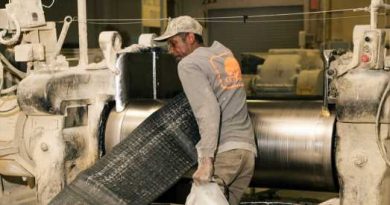As pandemic-induced remote work stretches into an 11th month -- far longer than most anyone anticipated -- Manhattan’s collateral damage is growing. Stores sit boarded up. Apartment rents are plunging. Some companies are looking atrelocating part or all of their businesses, following workers who have already decamped to sunnierlocales.
Now comes an effort from financial firms far afield from their normal territory: helping to distribute the Covid-19 vaccine. It’s a sign of how worried the industry is about its hometown, underscoring the fear that once it’s safe for employees to come back to Manhattan there will be little reason left for them to do so.
“Needles in arms and people back in their seats and offices” is the war cry from one of New York’s real estate moguls, William Rudin.
“We need to get the vaccine out more ubiquitously to every part of the city and get people confident and comfortable, to get them back into the city and back to work,” said Rudin, chief executive officer of Rudin Management Co., a major Manhattan landlord.
That sentiment was echoed by Goldman Sachs Group Inc. CEO David Solomon, who on Thursday was among Wall Street leaders on acall with the state’s vaccination czar and said the economy is unable to recover without broader access to shots. Some firms offered to help with vaccine distribution and logistics, or to lobby the Biden administration to increase New York’s allocation of doses.
The city is grappling with a dwindling supply, spurring Mayor Bill de Blasio this week tocancel more than 20,000 appointments for inoculations. More than a dozen hospitals and vaccine sites have paused appointments until the federal government provides more doses -- meaning any efforts by financial firms are more dependent on availability of shots rather than finding ways to get them into the arms of 8 million residents.
Empty Buildings
While Wall Street bosses have said they eventually want employees to return, the coronavirus’s persistence and the choppy vaccine rollout means remote work likely will continue well into 2021. As of Jan. 13, the New York area had an office occupancy rate of about 13%, according to data from Kastle Systems, which manages security access for commercial-property owners. That was the second-lowest figure among 10 major U.S. cities, behind onlySan Francisco.
With barely any workers and tourists commuting into commercial corridors, thousands of businesses, including retailers and eateries, have shut down since March. Availability rates for retail spacesurged across the city in the fourth quarter.
At the same time, workers are giving up expensive apartment leases in Manhattan, favoring the suburbs or cheaper areas, leaving swaths of empty units in the city and plummeting rents. Deals for commercial and residential propertyfell 46% last year compared with 2019, leading to a $1.6 billion loss in tax revenue for the city and state, according to a report Friday by the Real Estate Board of New York.
“The office market is the crux of the whole New York City economy,” said Ruth Colp-Haber, CEO of real estate services firm Wharton Property Advisors. “Until office workers come back to the market, restaurants, retail will not revive. Same with mass transit.”
Return Efforts
This isn’t the first time Wall Street’s leaders have set out to prop up commerce around their towers amid the pandemic. Around early September’s Labor Day holiday, executives across the industry made the case to skeptical subordinates that safety measures had reduced the risk of returning. Some even privately discussed compelling staff to come in.
But that campaign soon ran into the city’s mounting infection rates. AtCitigroup Inc., where an internal survey in September showed 30% of its people around New York wanted to return to offices in some fashion, the bank never reached that level in the fall. ForJPMorgan Chase & Co., in-person staffing hovered around 20% for much of season. And by December, desks at most firms were again thinning out.
Thursday’s call reflected concerns about what will happen to New York’s economy if the city doesn’t have a plan to better distribute vaccines. Aside from Goldman Sachs, JPMorgan, Citigroup and KKR & Co. were among the companies represented, according to participants.
After weeks of monitoring reports of patchy rollout of the Covid shots, many business leaders have been girding to jump in and offer up their expertise, in hopes of weeding out the bottlenecks. The tone of the call veered from offers of what they could do to help -- logistics, distribution, real estate -- as well as expressing bewilderment over the limited amount of information so far on what’s causing the hiccups.
The state’s vaccine chief highlighted the issues, and emphasized the problem lies with allocations more than distribution. Still, business executives have pleaded with officials to draw up a blueprint now to guarantee a smoother process.
Some of the big financial firms can offer up a wide distribution network, ranging from retail branches to near-empty hotels and other real estate they own in the city, and have suggested that as options to officials. They are also equipped with a medical team and are pressing the state to let them be more involved in the process.
Even if inoculations accelerate, it still will be many more months before Wall Street returns to any semblance of normal. JPMorgan CEO Jamie Dimon said last week that even as he expects mass vaccinations by June or July, it will take another couple months -- “hopefully by September” -- for workers to be comfortable in offices.
“You do see people want to go back to work once they feel safe,” he said on a Jan. 15 call with reporters. “A vaccine will be a big part of that.
— With assistance by Shelly Banjo, and Michelle F Davis
Source: Read Full Article
- U.K., Belgium Among Nations Seeking Cheaper India-Made Vaccines
- Montana County to Hold Public Hearings on Zoning Rules for Crypto Miners Amid Growing Complaints – Mining Bitcoin News


